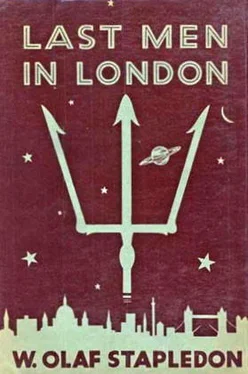I must now tell you what it was that I intended to do with Paul, and how I carried out my plan. I wished to perform certain delicate experiments on him and observe his reactions. To some of the readers of this book the mental vivisection which I had to practise upon Paul may seem merely brutal. I would remind them first that it was a necessary part of a very lofty task; second, that Paul himself in his best moments would have gladly accepted all and more of my torturing manipulation for the sake of that high enterprise; and lastly that the final result upon Paul, the individual human being, was a very great spiritual enrichment.
It is difficult to give you any clear idea of my aim beyond saying that, having found this uniquely typical yet also exceptionally self-conscious being, I intended to influence him periodically in such a manner that he should see his world as far as possible from the Neptunian point of view. I should then be able to observe in detail the effect of this vision on his primitive nature. Had he been of the heroic type, this policy would have turned him into some kind of prophet or crank. But he was made of milder stuff, and would never spoil my experiment in that style. Indeed, one effect of my intermittent manipulation of his experience was to inspire him with a dread of showing himself to be different from others. Just because he possessed a whole secret world of his own, and was prone to see the actual world turn farcical or hideous in the light cast by that other world, he became increasingly anxious to maintain a secure footing in the actual world and conform to all the customary modes of behaviour. For in spite of his Neptunian vision he remained essentially a product of his own world. But as my influence extended, he was forced to admit that there was something in him profoundly alien to his environment, something alien even to himself. At times he feared he was going mad; at other times he would persuade himself with immense complacency that he was ‘inspired’, and that he must indeed be a prophet; but as he was incapable of any such heroism, this delusion was soon shattered. There were moments when he threatened to break into two personalities, one the natural Paul, the other a violent and spasmodic idealist. But I had chosen him carefully; he was too well integrated actually to succumb to this easy solution of his conflict. Instead of disintegrating, he remained one mind, though torn and perplexed.
But as time passed a change came over him. At first he had regarded his native terrestrial mentality as himself, and the Neptunian influence as alien, disturbing, irrational, insane. He was fascinated by it, but he wished to keep it thoroughly suppressed and ineffective. Later, however, it came to seem a divine enlightenment, sane and joyous, still alien to himself but most precious. Then at last he began to try to live according to my influence, and incurred at once the ridicule and hostility of his own world. With horror he now foreswore his ‘inner light’ which had so misled him. He earnestly tried to become blind to it, and to be like his fellows. But my influence left him no peace. It found something responsive in him, which, as he matured, was emboldened to identify itself wholly with the Neptunian point of view. Little by little he came to think of this Neptunian factor in his mind as truly ‘himself’, and the normal Terrestrial as’ other’, something like an unruly horse which his true self must somehow break in and ride. There followed a period of struggle, which ended in despair; for it became clear that he could not master his Terrestrial nature. Indeed, it seemed to him that he himself was bound and helpless upon the back of this uncontrolled animal; or that while his body and his mundane intelligence went about the world performing all manner of aimless antics, his essential spirit was imprisoned somewhere in his head watching all, but almost wholly impotent. This essential spirit which he regarded as ‘himself’ was not, of course, merely my influence in him; it was his own best and most human nature, on which my influence was able to work. But this best of his was only the rudimentary best which was characteristic of his species; and though my influence had endowed it with an immense treasure of imagination, it remained almost wholly ineffective, as is usual with your kind. Yet there were times in his life when Paul did succeed in acting in a manner that was really human, and on these occasions my influence played a part. Of these crises I shall presently tell.
I know Paul perhaps better than I know myself. I have been Paul. I have been Paul throughout his life, and watched him to the very moment of his death. The more important passages of his life I have experienced again and again. I know little intimate facts about him, like the feel of the inside of his mouth. I know the feel of Paul slightly drunk, Paul sexually excited, and Paul with one of his bad colds. I know, far better than Paul himself knew it, the obscure tone of his whole body, when through eating too many muffins, he seemed to see the world itself turn foul. I know also, and can hold together for comparison, the feel of Paul the child, Paul the boy, Paul the young man, stiffening into middle age, and Paul awaiting death in helpless senility.
Fortunately there is no need for me to tell you all the details that I know about Paul. I have only to make you realize the main mental themes or motifs of his life. I need not, for instance, tell you much about his birth. It was a normal birth. Several times I have examined the obscure experiences which harassed him during that earliest of his adventures. For it seemed possible that even then something might have occurred to contribute to his idiosyncrasies. But neither in his passage into the outer world nor in his fungoid pre-natal experience (so difficult for the explorer to penetrate) did I find anything significant, save what is common to all his kind. In Paul, whose nature was more sensitive than the average, the shock of exchanging the elysium of the womb for an alien world was serious, and was accentuated somewhat by the clumsiness of the physician. But it caused no unusual damage to his mind, nothing but the common yearning toward a warmer, cosier, less noxious world, which, in so many of you, favours legends of a golden age in the past, or of a golden heaven in the future.
One feature of Paul’s experience of birth was indeed significant, and served to confirm my choice of him as a subject of experiment. Like many others, he did not breathe till a smack made him take breath to bellow. I experienced, of course, his bewildered fury at the chastisement. I also experienced his awareness of the cold air that flooded his lungs, and the shock of glee that came with it. In that instant a connexion was registered in Paul’s mind for ever after, a connexion between what I may call fate’s smiting and the breath of life. In after years Paul was to know himself a coward, yet in spite of his cowardice, he was ever to seek in the harshness of fate for the breath of a new life. Even though, in all his ages, he yearned to creep back into the warm close peace of the womb, he craved also to absorb into his blood the atmosphere of a wider world.
I need not describe Paul’s arduous self-education in the cot, the nursery and the garden. Like all organisms he had to learn to cope with his world. Like all animals he had to grapple with the problems of perceiving and acting in a world of space and time. Little by little he learned to observe and to respond to all manner of objects, such as the rotund and fragrant dairy of his mother’s breast, and the less delectable bottle. He learned the geography of his own body, mapping it out patiently, unwittingly, day by day, in a surprisingly intricate system of explorations, discovering that all these complex findings fell together beautifully in a three-dimensional system of touch and sight. Many great arts he acquired, first the art of sucking, and of shifting about in bed, then the art of the rattle. Presently he learned how to use his whole body as a vehicle to transport him to and fro in a wider sphere. He mastered the more dangerous arts of crawling and walking, the art of the bouncing ball, and so on. Meanwhile he had distinguished the soothing and indignant tones of the human voice. Also, the intermittent human breasts and arms and laps and voices had fallen into order to make more or less constant systems, each of which might be expected to behave in a distinctive manner. Then at last he discovered that human voices had meanings, and that he himself could use these noises so as to make the great grown-up creatures do his bidding.
Читать дальше












